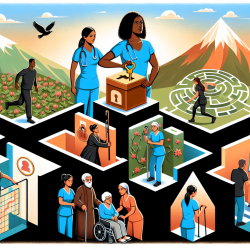Introduction
In the field of speech-language pathology, understanding the diverse factors that influence children's health outcomes is crucial. A recent study titled "Parental Ethnic Identity and Its Influence on Children’s Oral Health in American Indian Families" sheds light on the significant role ethnic identity plays in shaping oral health behaviors and outcomes. This blog explores the findings of this study and offers insights on how practitioners can enhance their skills and improve outcomes for children by integrating these findings into their practice.
The Study: Key Findings
The study, conducted on a Northern Plains tribal community, examined the relationship between parental ethnic identity and oral health knowledge, beliefs, behaviors, and outcomes among American Indian families. The research utilized data from a randomized controlled trial involving 579 parent-child dyads. The study found that ethnic identity, particularly the perceived importance of tribal identity, was associated with a range of oral health constructs.
- Parents with a strong sense of tribal identity demonstrated higher levels of oral health knowledge and engagement in positive oral health behaviors over time.
- These parents perceived dental caries as a severe health concern and believed their efforts directly influenced their children's oral health, rather than attributing it to chance.
- Tribal language proficiency was linked to better parental oral health status, although it did not significantly impact other oral health constructs.
Implications for Practitioners
For practitioners working with American Indian families, these findings underscore the importance of considering ethnic identity in oral health interventions. Here are some strategies to integrate these insights into practice:
- Incorporate Cultural Context: Understanding the cultural context and ethnic identity of families can enhance communication and engagement in health-promoting behaviors.
- Leverage Tribal Identity: Encourage parents to draw on their tribal identity and cultural practices as strengths in promoting oral health behaviors.
- Promote Language Proficiency: Support initiatives that enhance tribal language proficiency, as it may indirectly contribute to better health outcomes.
Encouraging Further Research
While this study provides valuable insights, it also highlights the complexity of the relationship between ethnic identity and oral health. Further research is needed to explore these dynamics across different Native communities and to identify additional factors that may influence health outcomes. Practitioners are encouraged to stay informed about ongoing research and to contribute to the growing body of knowledge in this area.
Conclusion
The findings from this study offer a compelling case for integrating ethnic identity considerations into oral health interventions for American Indian families. By doing so, practitioners can enhance their effectiveness and contribute to improved health outcomes for children. As we continue to learn more about the interplay between culture and health, it is essential to remain committed to data-driven, culturally sensitive approaches in our practice.
To read the original research paper, please follow this link: Parental Ethnic Identity and Its Influence on Children’s Oral Health in American Indian Families.










